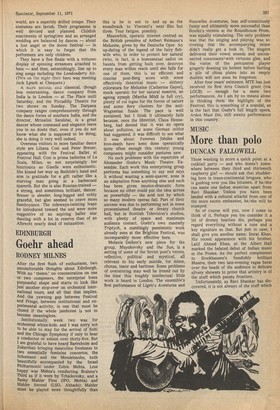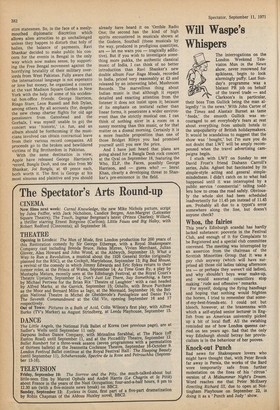MUSIC
More than polo
DUNCAN FALLOWELL
Those wanting to score a quick point at a cocktail party — and who doesn't somewhere between their third and thirteenth raspberry gin? — should ask that shuddering bore in trans-continental brogues, who is gushing over you like bitumen, if he/she can name one Indian musician apart from Ravi Shankar. Unless you have been landed with a cultural attache from one of the more exotic embassies, he/she will be stumped.
So of course will you, now I come to think of it. Perhaps you too consider it a lot of droney heathen din, perhaps you regard everything without a tune and a key signature as that. But just in case, I shall give you another name: Imrat Khan. His recent appearance with his brother, Latif Ahmed Khan, at the Albert Hall marked the belated debut of Indian music at the Proms. As the perfect complement to Stockhausen's fiendishly brilliant Mantra, their two late-evening ragas burst over the heads of the audience in delicate silvery showers to prove that artistry is of the stuff which passes frontiers.
Unfortunately, as Ravi Shankar has discovered, it is not always of the stuff which stirs statesmen. So, in the face of a mealymouthed diplomatic discretion which allows alien atrocities to go unchallenged unless they happen to disturb that holy of holies, the balance of payments, Ravi Shankar decided to make public his con. cern for the events in Bengal in the only way which now makes sense, by supporting the Free Bengal movement against the horrifying brutality of their military overlords from West Pakistan. Fully aware that the international language is not esperanto or love but money, he organised a concert at the vast Madison Square Garden in New York with the help of some of his occidental box-office friends: George Harrison, Ringo Starr, Leon Russell and Bob Dylan, among others. By all accounts (for, despite the new cheap charter flights for old age pensioners from Gateshead and the Gorbals, I was myself unable to go) the concert was 'historic,' i.e. fun, and an album should be forthcoming if the musicians involved can obtain contractual leave from their various record companies. All proceeds go to the broken and bewildered victims of Big Brotherdom in Pakistan.
With the same destination in view, Apple have released George Harrison's "ecord, Bangla Desh, and one also from Mr Shankar, Joi Bangla, at 49 pence each, both worth it. The first is George at his most sinuous and plaintive and you should already have heard it on 'Orrible Radio One; the second has the kind of high spirits encountered in musicals shown at the Godeon, Southall (these musicals by the way, produced in prodigious quantities, are — let me warn you — tragically addictive). But if you wish to investigate something more pukka, the authentic classical music of India, I can think of no better introduction than Ravi Shanker's new double album Four Raga Moods, recorded in India, priced very reasonably at £3 and released by an interesting label, Mushroom Records. The marvellous thing about Indian music is that although it repays detailed and exacting attention from the listener it does not insist upon it; because of its emphasis on textural rather than linear forms, it penetrates a wider environment than the strictly musical one. I can think of nothing nicer in a room on a sunny morning than this music, or for that matter on a dismal morning. Certainly it is a more feasible proposition than one of those Bridget Rileys you had promised yourself until you saw the price.
And I have just heard that plans are going ahead for a Bangla Desh rock concert at the qval on September 18, featuring the Who, ELP, the Faces, possibly George Harrison, and — guess who? — Imrat Khan, clearly a developing threat to Shankar's pre-eminence in the field.











































 Previous page
Previous page